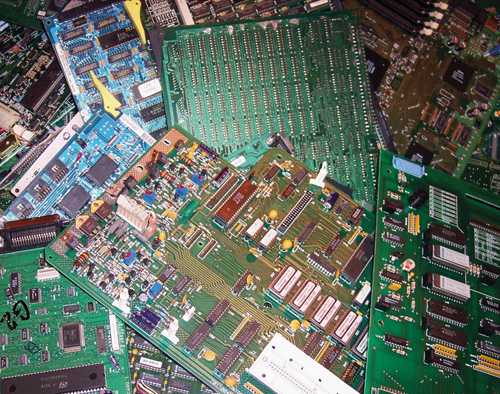 After an uncertain start, the state law that bans trashing electronic waste has kept heaps of toxic material out of landfills and created jobs. But just how many jobs is unknown, and as the Legislature considers expanding the program it is also looking to tweak the rules with job creation in mind.
After an uncertain start, the state law that bans trashing electronic waste has kept heaps of toxic material out of landfills and created jobs. But just how many jobs is unknown, and as the Legislature considers expanding the program it is also looking to tweak the rules with job creation in mind.
 |
Oregon has 230 e-waste collection businesses. |
After an uncertain start, the state law that bans trashing electronic waste has kept heaps of toxic material out of landfills and created jobs. But just how many jobs is unknown, and as the Legislature considers expanding the program it is also looking to tweak the rules with job creation in mind.
The state’s oversight agency, Oregon E-Cycles, doesn’t track the number employed in jobs related to the program. However, the volume of computers, monitors and televisions recycled under the law and figures kept by the program’s largest recycler indicate that hundreds of jobs have been created since the program began.
Under the law, manufacturers doing business in the state must pay into a state-administered program or participate in a manufacturer-created program that reimburses the collectors and recyclers of toxic e-waste.
In 2010, the first year of the ban, Oregonians recycled more than 24 million pounds of e-waste. It was an increase of 5 million pounds from a trial run the previous year, partly explained by new collection facilities in Eastern Oregon and other rural areas.
Now there are about 230 collecting organizations. That’s actually fewer than last year, but it doesn’t mean fewer workers, says E-Cycles program manager Kathy Kiwala. E-waste collectors range from nonprofits to solid-waste collectors. And there are five recycling processors in the state, with another two in Washington and one in California.
Universal Recycling Technologies in Clackamas, which recycled more than a third of Oregon’s e-waste last year, opened after the law passed. URT expects to move to a new building and hire more workers this year, though it can’t say how many.
The 30 or so collectors who work with URT have hired about 40 people total since the ban. “When you talk about job creation, that doesn’t even account for the network of transportation and the other collection networks,” says Tom Pritchett, URT’s director of environmental health and safety.
At a recent hearing on amending the e-waste law before the Environment and Natural Resources Committee, state legislators pressed the need for job creation in Oregon, but more immediately they looked to incentivize more recycling with credits for manufacturers who exceed their recycling quotas, which they could sell to others who lag behind.
A 2010 study predicts global growth for e-waste. The challenge for Oregon is to channel that growth into jobs and measure it.


